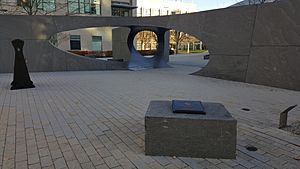Sean Collier Memorial facts for kids
The Sean Collier Memorial is a special sculpture at the Massachusetts Institute of Technology (MIT) in Cambridge, Massachusetts. It was built to remember Sean Collier, a brave officer with the MIT Campus Police. Officer Collier tragically lost his life on April 18, 2013, while on duty.
This unique memorial was designed by teachers and students from MIT. It was finished very quickly, in less than two years, and officially opened on April 29, 2015.
Contents
Remembering Sean Collier
Soon after Officer Collier's death, people started leaving flowers, messages, and small items at the spot where he died. This showed how much the MIT community cared. Everyone wanted to create a lasting memorial to honor him.
So, a group of students, teachers, and police officers came together. They asked for ideas from the public in June 2013. The final design for the memorial was chosen in April 2014. This gave them just one year to build it!
Who Designed and Built It?
J. Meejin Yoon, who was in charge of the MIT Department of Architecture at the time, led the design team. She helped create the memorial's overall shape.
The important engineering work was done by John Ochsendorf, a professor who won a special award called the MacArthur Prize, and his students. They made sure the structure would be strong and safe.
A company from Boston called Suffolk Construction built the memorial. Their project manager, Rob Rogers, was Officer Collier's stepbrother. This made the project even more meaningful for him.
On April 29, 2015, MIT held a special ceremony to open the memorial. MIT President Rafael Reif said that the memorial showed how the community came together after a sad event. He said, "We are held together by invisible forces too."
What Does the Memorial Look Like?
The memorial is made of 32 huge granite blocks. These blocks were shaped very precisely using computers. They fit together to form a shallow, open domed arch. Five support "wings" spread out from the arch, like the fingers of an open hand.
Special Meanings in the Design
The shape of the memorial reminds us of MIT's motto, Mens et Manus, which means "Mind and Hand." It also represents Officer Collier's helpful spirit.
The material, granite, was chosen because Sean Collier loved hiking in the nearby White Mountains (New Hampshire) with the MIT Outing Club.
The architect, J. Meejin Yoon, explained that the heavy stone blocks support each other. This shows how strong people can be when they work together.
Inside the memorial, there's a large empty space. This space represents Officer Collier's absence. It's shaped like a special stone from a memorial cairn (a pile of stones) that his friends from the MIT Outing Club had built for him on a hiking trail.
How It Was Built
Professor John Ochsendorf and his students used computer simulation to check the design. They wanted to make sure it could stand strong, even during a major earthquake.
The memorial is very heavy, weighing about 190 short tons (that's like 380,000 pounds!). It sits on strong reinforced concrete foundations and mini-piles that go deep into the ground.
Skilled workers used cranes and special machines to put the polished stone blocks in place. The blocks were carved to be incredibly precise, within half a millimeter!
After the stones were set, the temporary supports were slowly lowered over eight hours. The large central stone, called the keystone, was watched carefully as it settled into place.
Location and Special Features
The memorial is built right next to the spot where Sean Collier was on duty. An opening in the structure frames a view of where his police car was parked.
You'll find small, raised stainless steel buttons on the ground beneath the arches. These buttons have Officer Collier's police badge number, "179," written in Braille. They also help stop skateboarders from damaging the memorial.
Smaller granite blocks are placed around the memorial. These are for visitors to sit and reflect.
At night, special LED lights illuminate the structure. These lights also show the pattern of the stars in the sky on the night of April 18, 2013.


